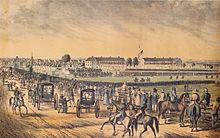George Hume Steuart | |
|---|---|
 Major General George H. Steuart reviews the Maryland Militia at Camp Frederick, 1843 | |
| Born | November 1, 1790 Anne Arundel County, Maryland |
| Died | October 21, 1867 (aged 76) Baltimore, Maryland |
| Place of burial | Green Mount Cemetery, Baltimore, Maryland |
| Allegiance | |
| Service/ | |
| Years of service | 1814-1861 |
| Rank | |
| Commands | 5th Maryland Regiment, Maryland Militia |
| Battles/wars | War of 1812 |
| Relations | George H. Steuart (grandfather) George H. Steuart (son) William Steuart (uncle) Richard Sprigg Steuart (brother) |
| Other work | planter, politician, lawyer |
George Hume Steuart (1790–1867) was a United States general who fought during the War of 1812, and later joined the Confederate States of America during the Civil War. His military career began in 1814 when, as a captain, he raised a company of Maryland volunteers, leading them at both the Battle of Bladensberg and the Battle of North Point, where he was wounded. After the war he rose to become major general and commander-in-chief of the First Light Division, Maryland Militia.
During John Brown's raid on Harpers Ferry in 1859, Steuart personally led a detachment of militia, and, as the prospect of civil war drew closer, he was among those who lobbied unsuccessfully for Maryland to secede from the Union. In 1861, at the start of the Civil War, Steuart left his home state of Maryland and joined the Confederacy, though at 71 years of age he was by then considered too old for active service. This did not prevent him from personally riding with Lee's army and even being captured at the First Battle of Manassas.
He is sometimes confused with his eldest son, Brigadier General George H. Steuart, who fought for the Confederacy at a number of major battles, eventually surrendering with General Robert E. Lee at Appomattox in 1865. Steuart died in 1867, his health and fortune ruined by his devotion to the Southern "lost cause".